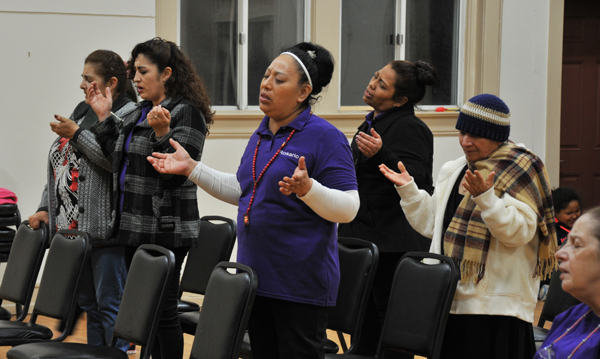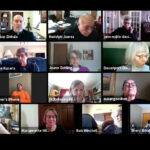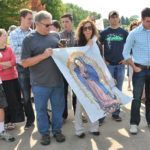By Lindsay Steele
The Catholic Messenger
Sister Irene Munoz, CHM, was at a Catholic Charismatic Renewal conference in Omaha in the early 1970s, unsure of what to think of the passionate expressions of faith occurring around her. She was brought up in pre-Vatican II, a time when expressions of faith were, by tradition, much more subdued. But, she was open to the experience and allowed a group of people to pray over her. “I felt this hot energy go from the top of my head down to my feet, and then it was gone.”

Members of Grupo Carismatico Luz y Esparanza (Light and Hope Charismatic Group) sing worship music at St. Mary Parish in Davenport on March 2.
That warmth, she suspected, was God. “It wasn’t fear, but it was joy and love, and an (affirmation) that he is alive,” she recalled. “When you know God is alive, somehow it changes your mind and heart and everything, and you want others to experience it.”
Charismatic prayer groups have been present in the diocese for nearly 50 years. Charismatic refers to the word “charism,” or gift of the Holy Spirit. Catholic Charismatic Renewal, which officially began in 1967 at a college in Pennsylvania, places a strong emphasis on being open to the action of God’s Spirit and expressing charisms to grow the church, as early Christians did at Pentecost. Recent popes have spoken in support of the renewal.
Elements of charismatic prayer meetings include praise and worship, testimonies, the discernment of spiritual gifts, Scripture, teaching and intercessory prayer. There is often quiet time, with people being encouraged to listen to what the Lord is saying to them. Some will sense that God has a message of encouragement, exhortation or consolation for the group, and will feel moved to speak this out.
Groups boost church involvement
Sr. Munoz observes that Catholics who are involved with the prayer groups develop a strong sense of faith and purpose and a heightened appreciation for the sacraments. In Ottumwa, several longtime couples who had never been married in the church decided it was time to do so. Many individuals and families begin attending Mass more regularly. Several members of the charismatic prayer group have been inspired to go through the diocesan Ministry Formation Program (MFP) and become lay leaders. “Once they are touched by the Holy Spirit, they become hungry to know more about this God who is so alive. They want to be in community and celebrate what God has given to them, but more than that, they want to evangelize.”
Father Joseph Sia, pastor of St. Joseph Parish in Columbus Junction, said most of the lay leaders in his parish are also involved in St. Joseph’s charismatic prayer group. “This should be the ultimate goal of any parish group — to get the members involved in the life of the parish and participate more actively in liturgy.”
About charisms
Any God-given skill used to build the church could be considered a charism, Sr. Munoz said. For example, someone who is talented at sewing, crocheting or knitting could make prayer shawls. Someone with a gift for public speaking could become a lector. Someone who is a talented singer or instrumentalist could help with music worship at Mass. Prayer groups can help members figure out what their gifts are and how to apply them.
One recognizable aspect of charismatic prayer is that its participants sometimes speak in tongues during prayer and worship. Although it is not the focus or purpose of the prayer groups, “when people think of the charismatic movement, they often have this picture in mind,” said Father Troy Richmond, pastor of Ss. Mary & Mathias Parish in Muscatine. He has been part of Catholic Charismatic Renewal since college. He said speaking in tongues is one of many gifts of the Holy Spirit — sometimes manifested as an ability to quickly learn established languages, but most often used as a private prayer language. Speaking in tongues is not essential, nor is it considered more important than other gifts. “As St. Paul reminds us, the most important gift of all is love.”
Finding peace and community
The charismatic prayer group at St. Paul the Apostle Parish in Davenport helped parishioner Jeanne Wonio to understand and make sense of an experience she had as an 18-year-old college student. She had been trying to find a philosophy of life for herself and, one night, she put down her philosophy books and opened the Bible. “I opened to the Book of John. The first line I read was, ‘God is love.’ I think, at age 18, I was kind of searching for the meaning of love and life. So that just hit my heart that night. I was overcome by a sense of peace. I really identified it as God’s peace.”
This experience bolstered her Catholic faith and motivated her to get more involved with the church. But she wasn’t sure how to explain that initial encounter. These types of experiences weren’t emphasized during her pre-Vatican II youth, she said. When she began attending healing Masses around 1980, she met people with experiences similar to the one she had at age 18. Finally, she understood what had happened to her — she had encountered the Holy Spirit in a life-altering way. She began to attend the charismatic prayer group at St. Paul’s, and learned how just how powerful the Holy Spirit can be — not just through one encounter, but for a lifetime. “It’s about inviting the Holy Spirit to work through us and guide us and give us the wisdom to do the ministries we need to do,” she said.
A good fit
A majority of charismatic prayer groups in the diocese today are based at parishes with a high percentage of Hispanic members. Worldwide, this form of prayer is most popular in Latin America, according to International Catholic Charismatic Renewal Service.
Fr. Richmond observes that the nature of the renewal seems to fit well with Hispanic culture. “In general, Hispanics are very expressive and passionate people.”
Charismatic prayer fits Fr. Richmond’s style, too. “I have always had a strong devotion to the Holy Spirit. While silent prayer and contemplation are very much part of my prayer life, there is something exhilarating about praising and worshipping the Lord with others in the Spirit.”











